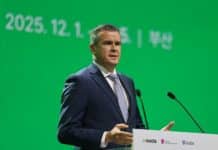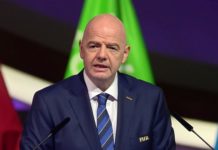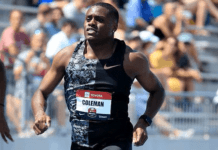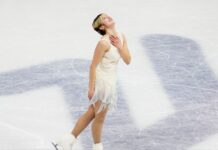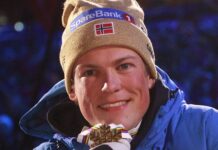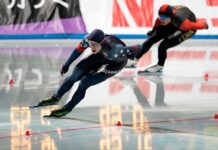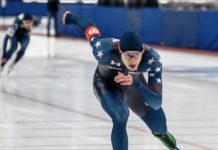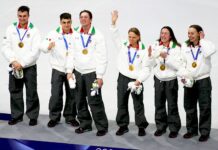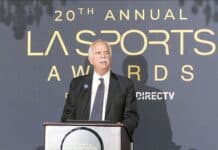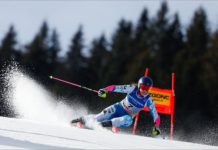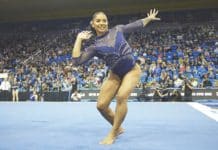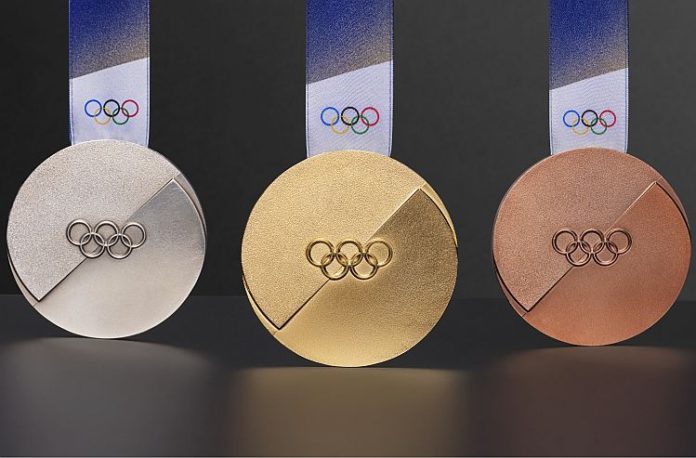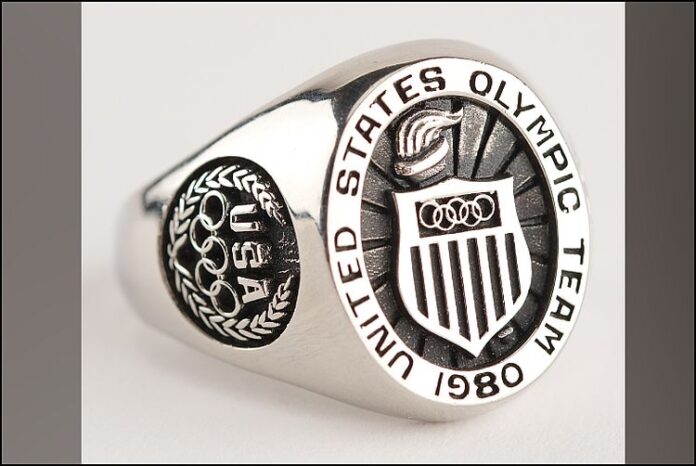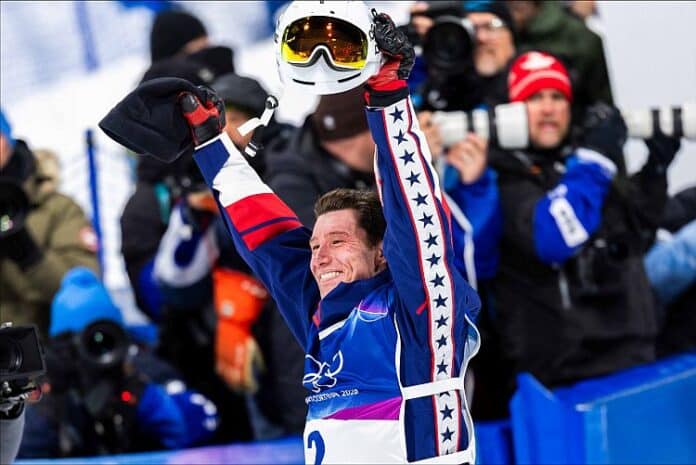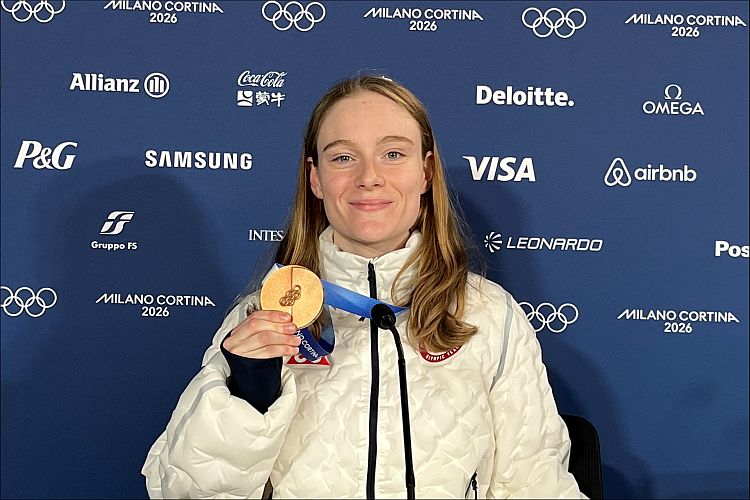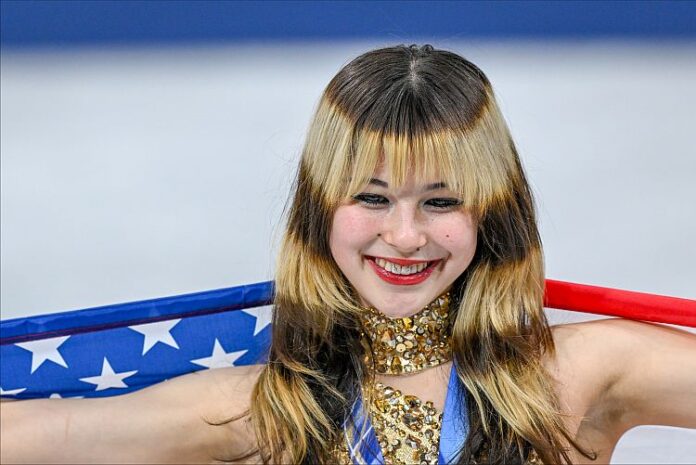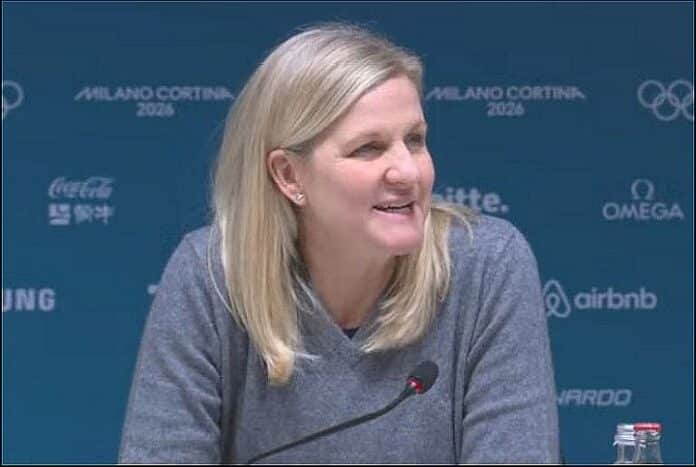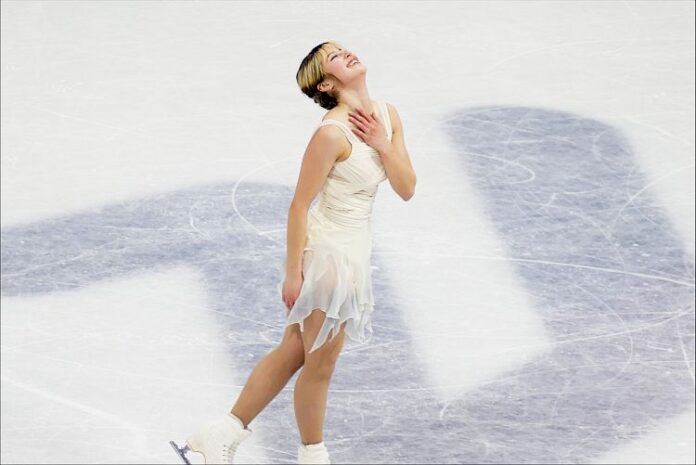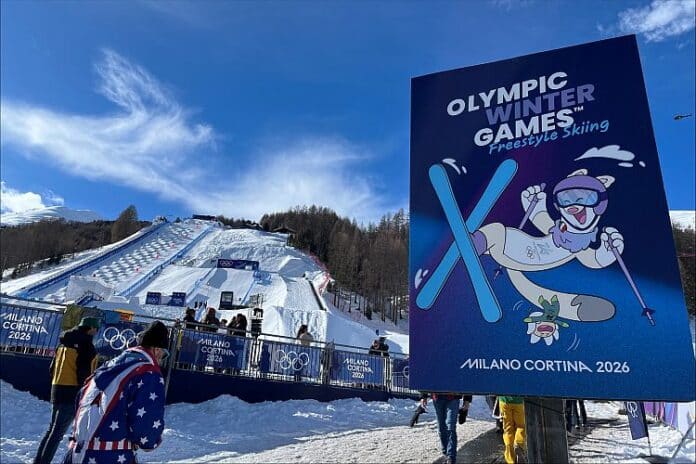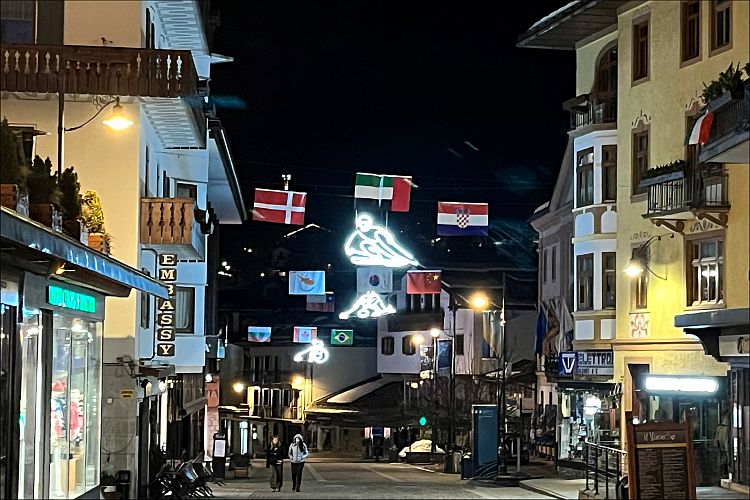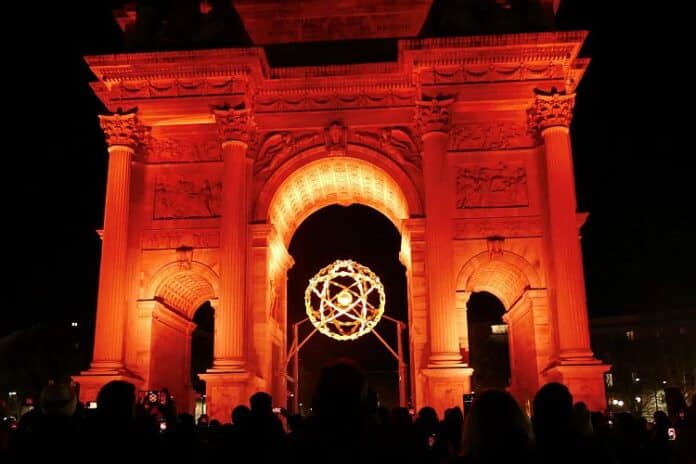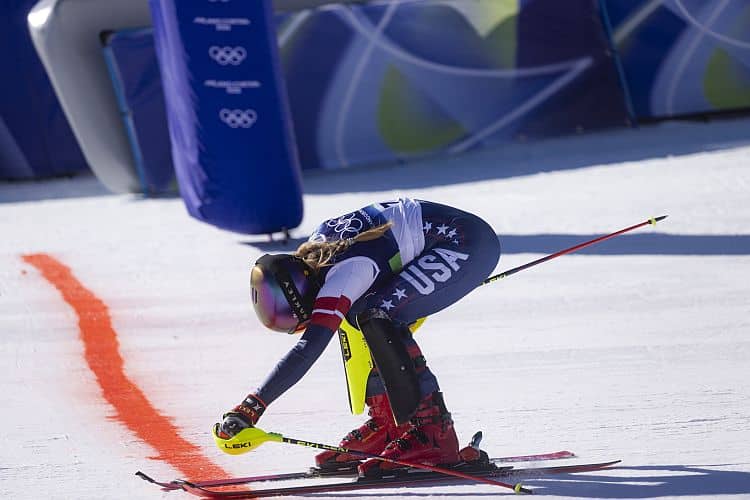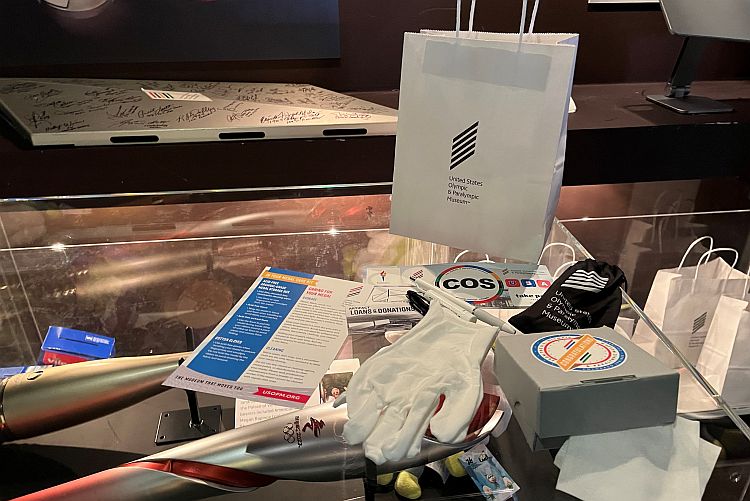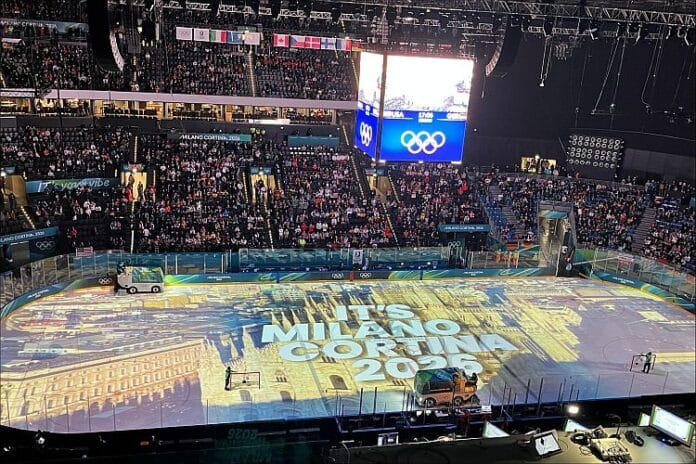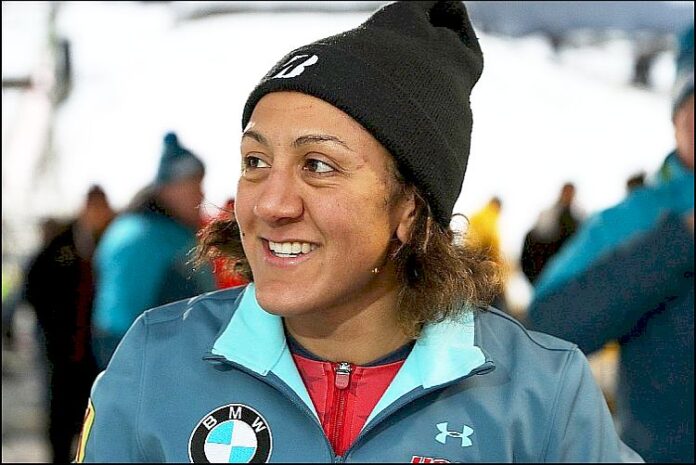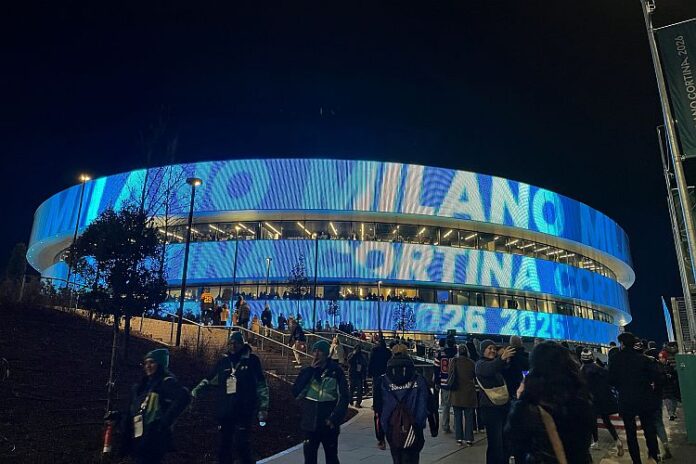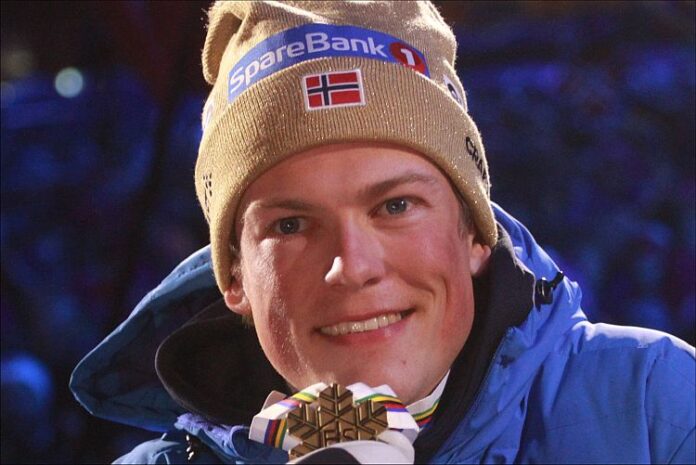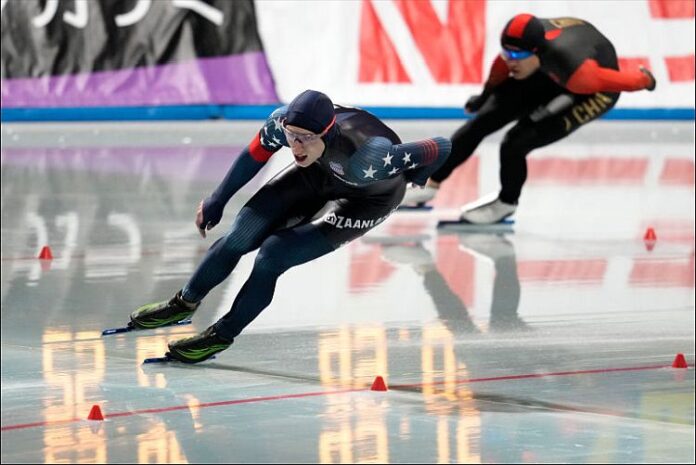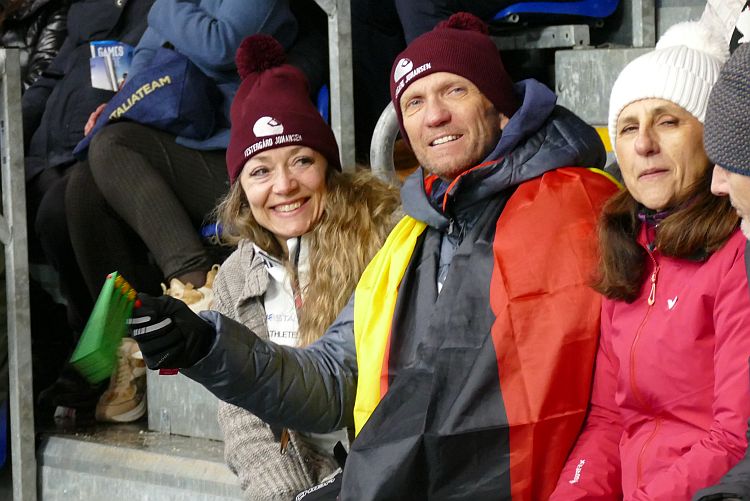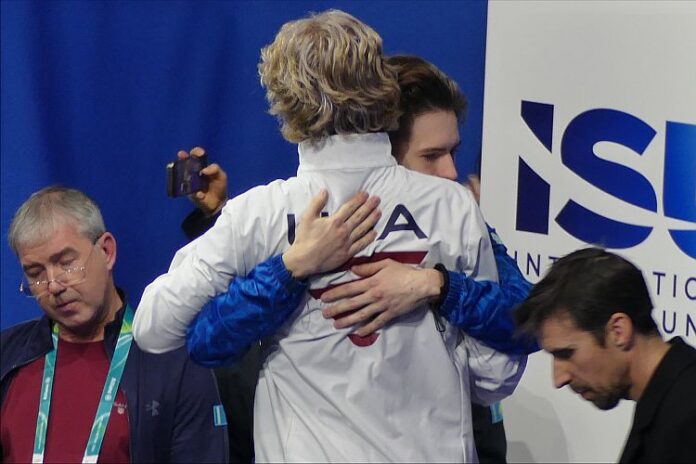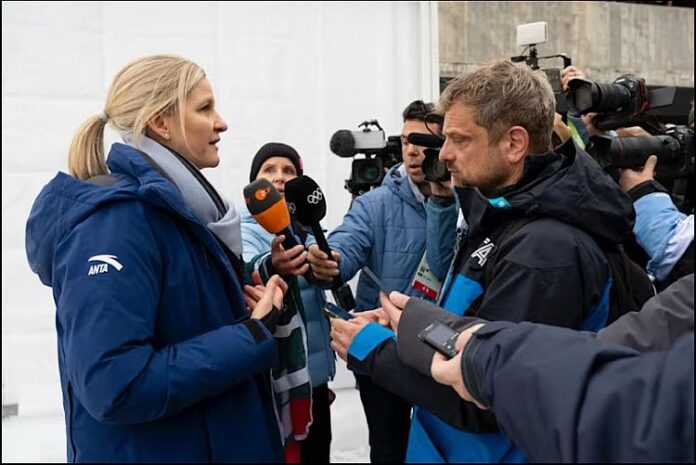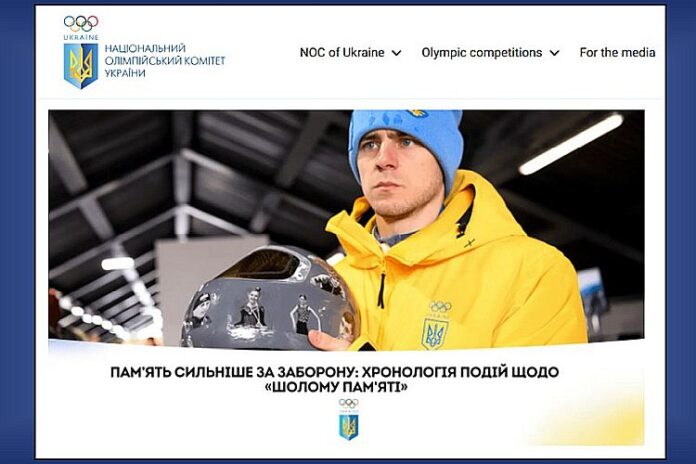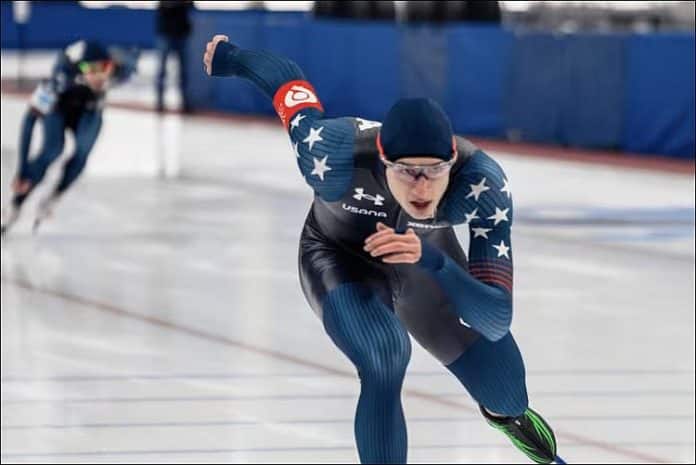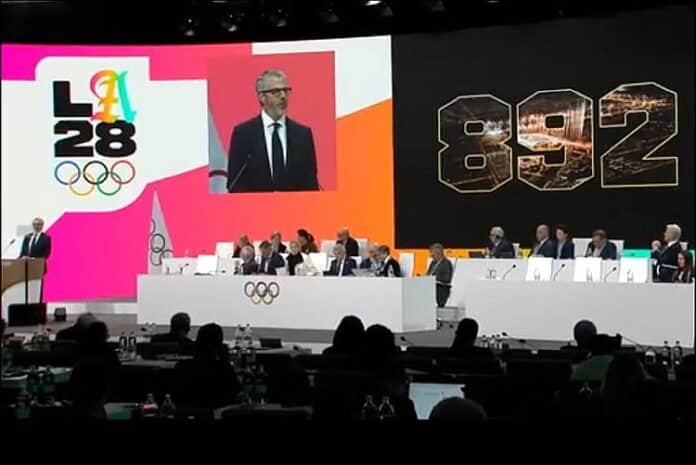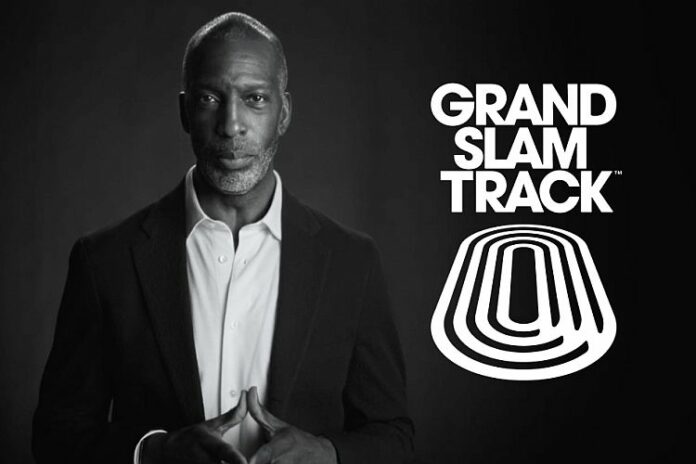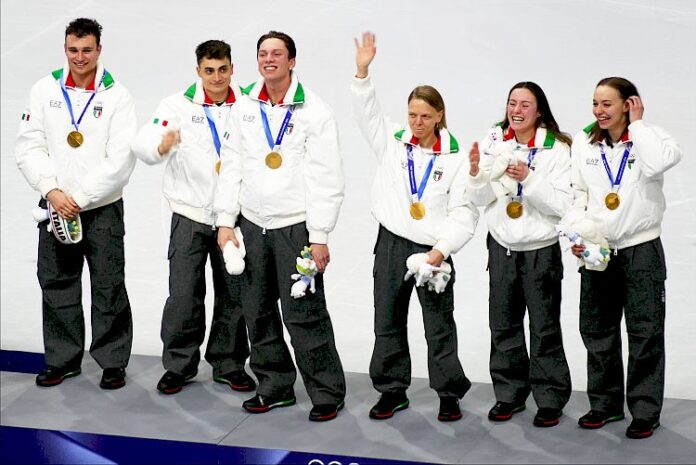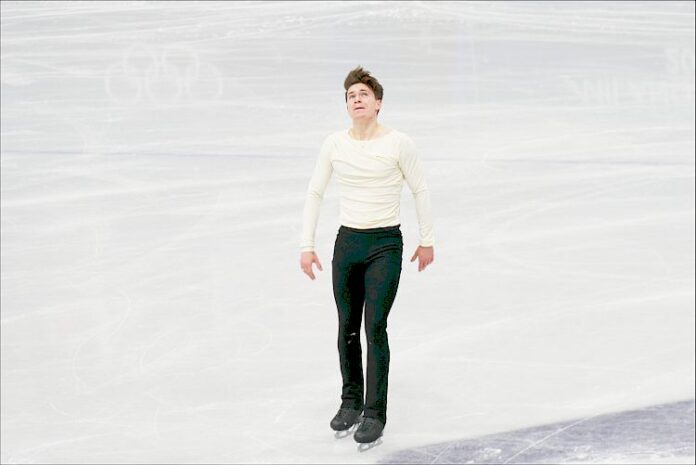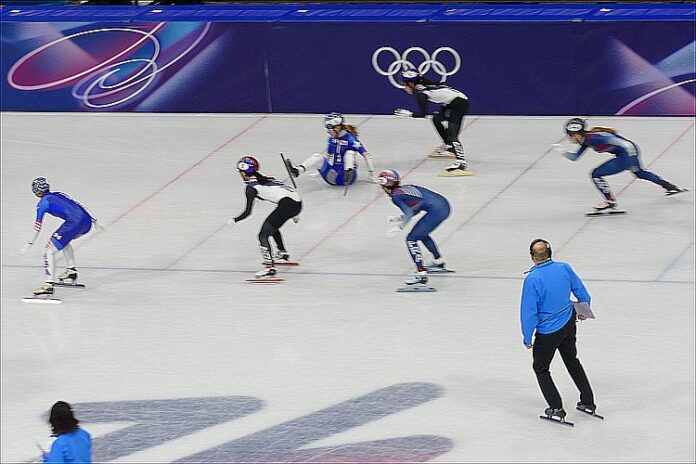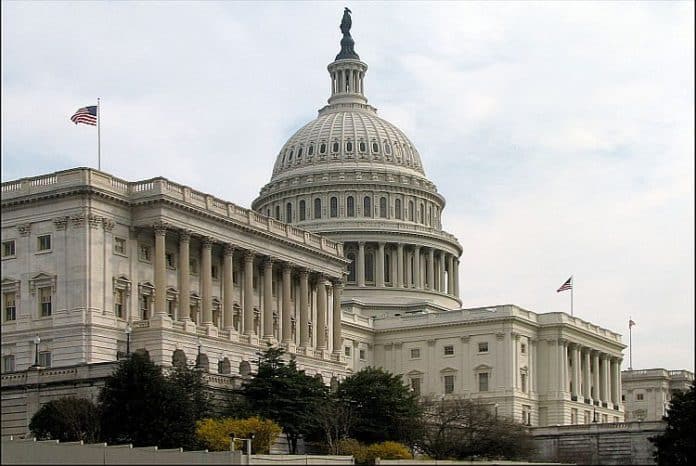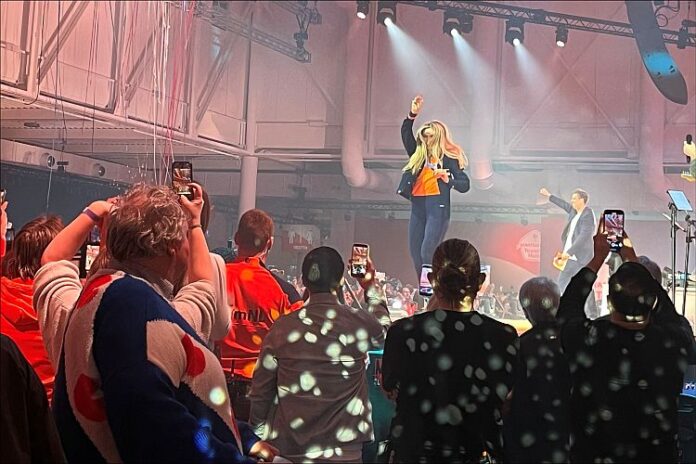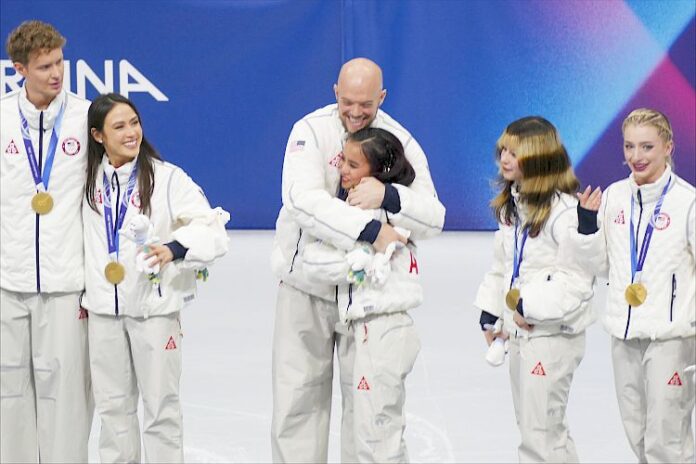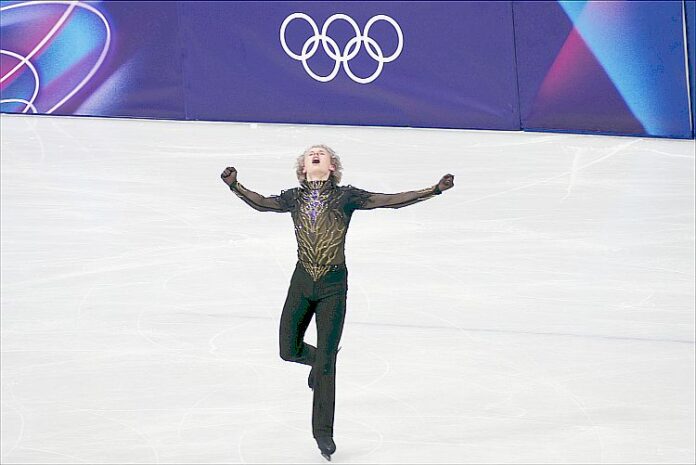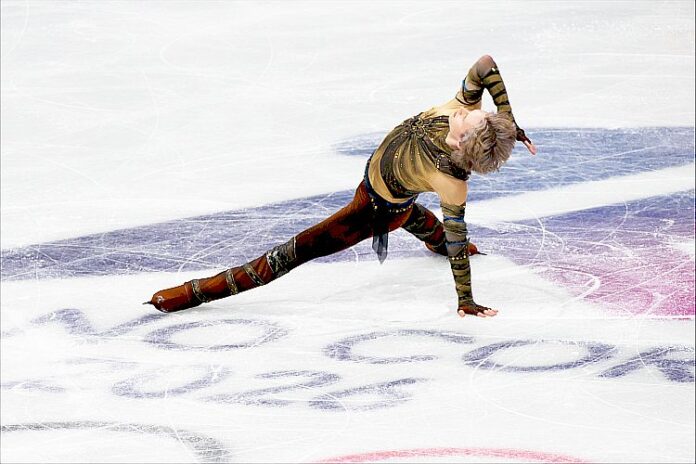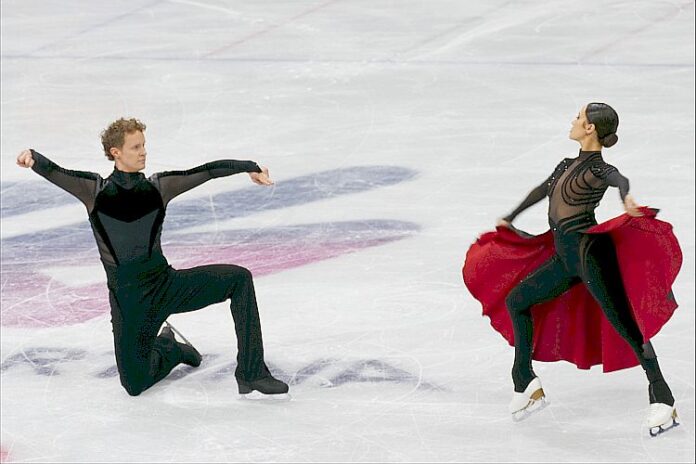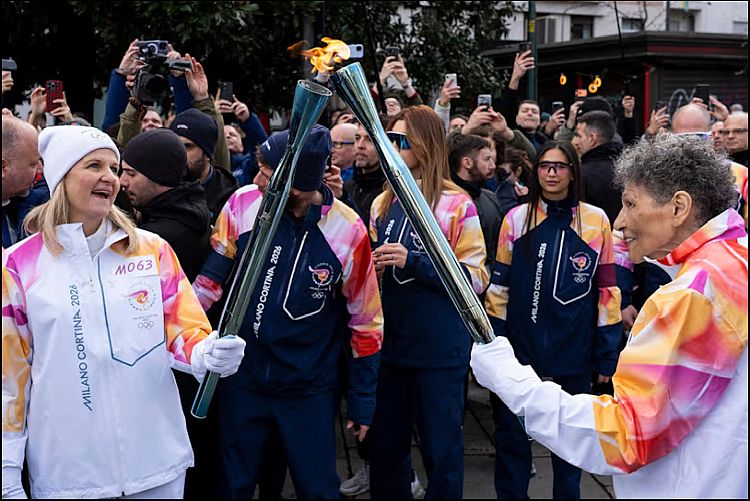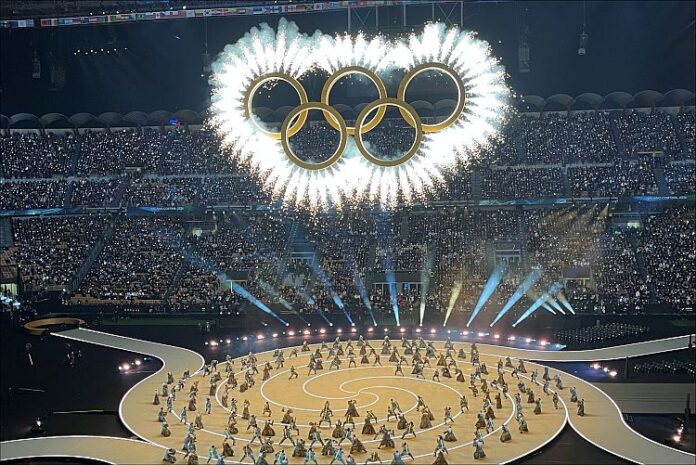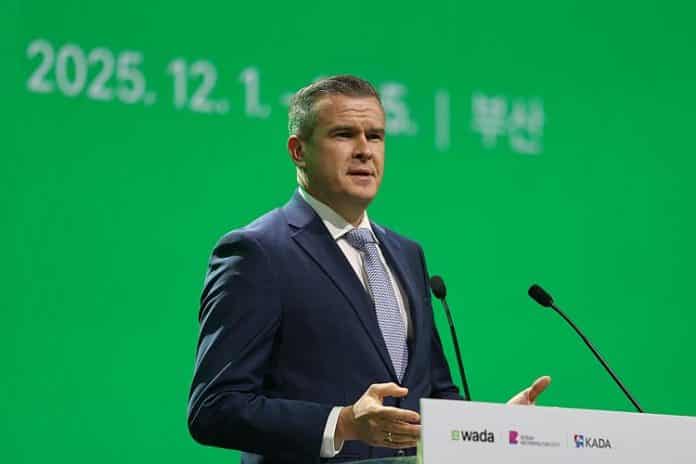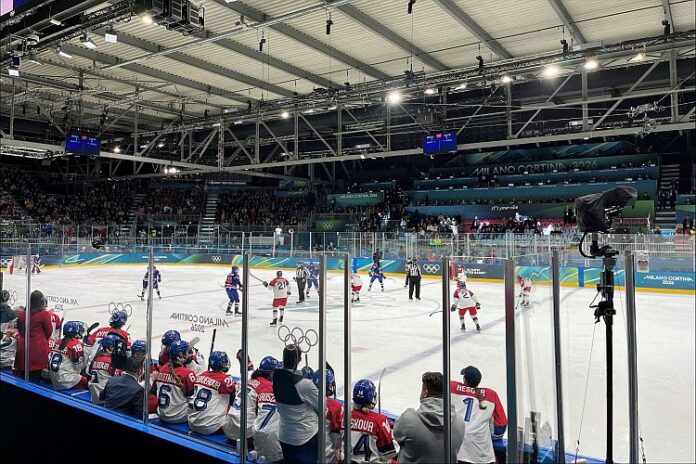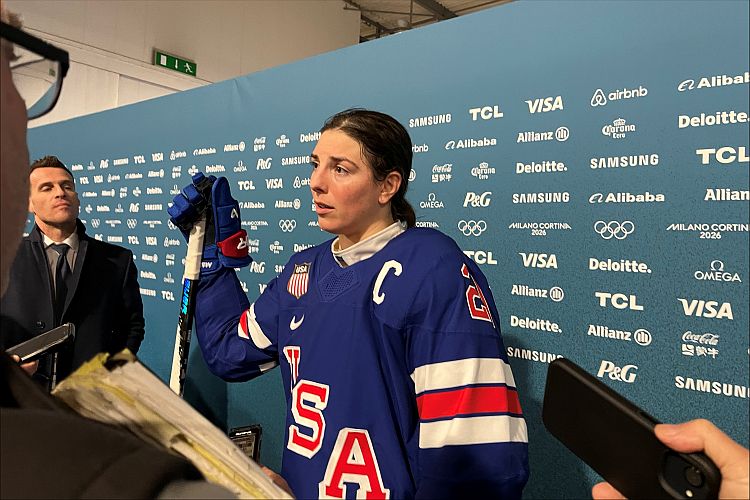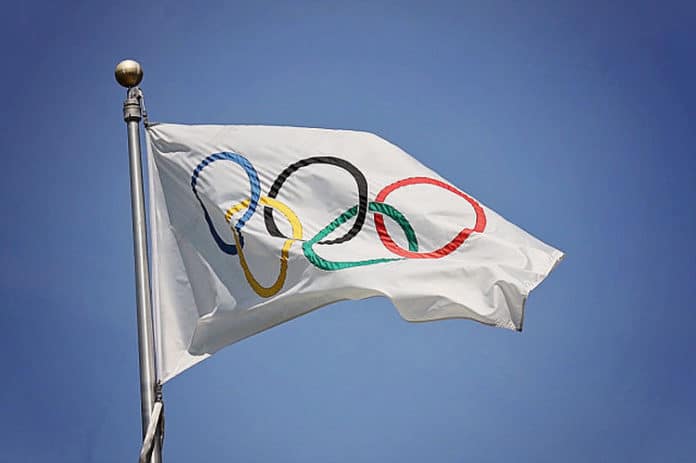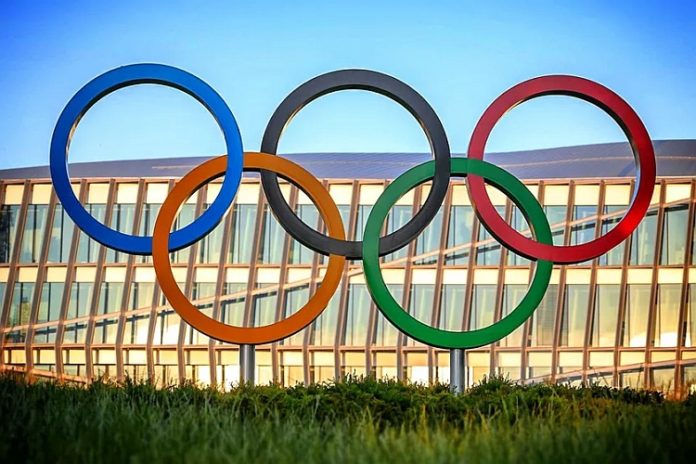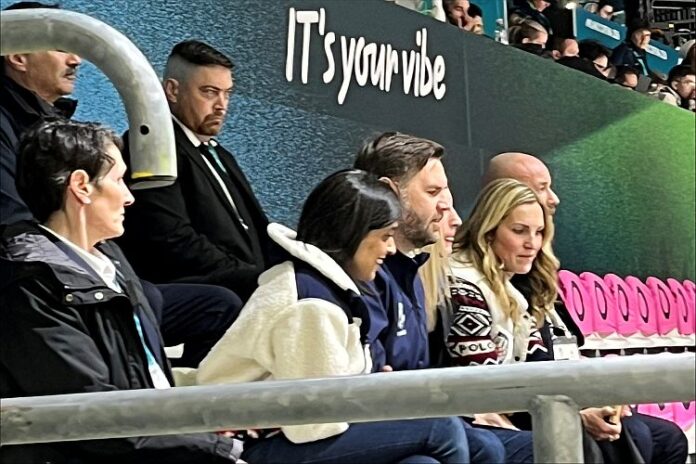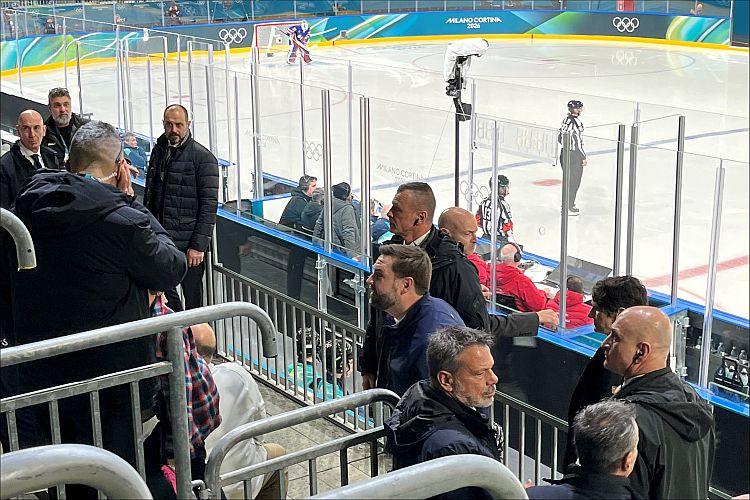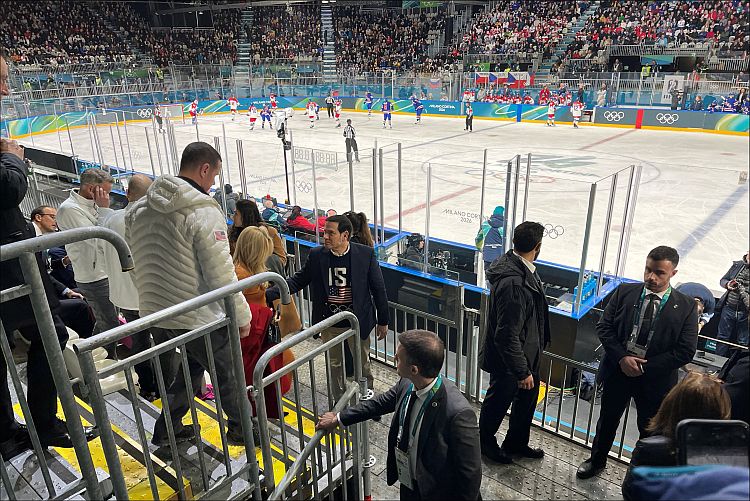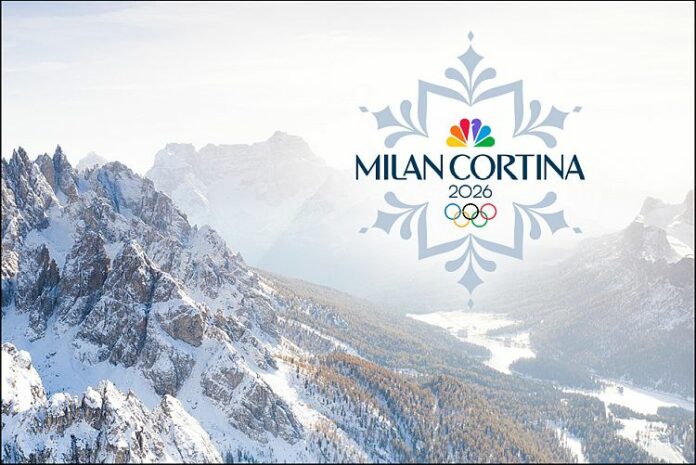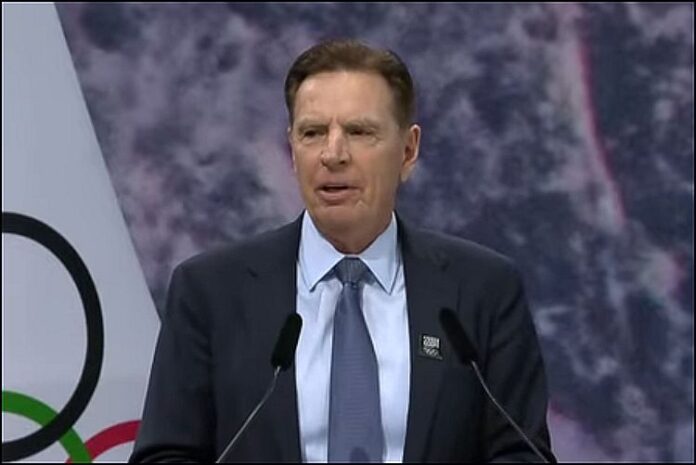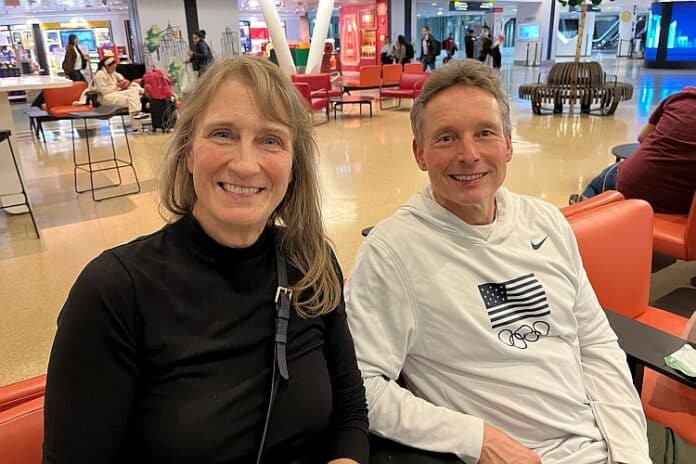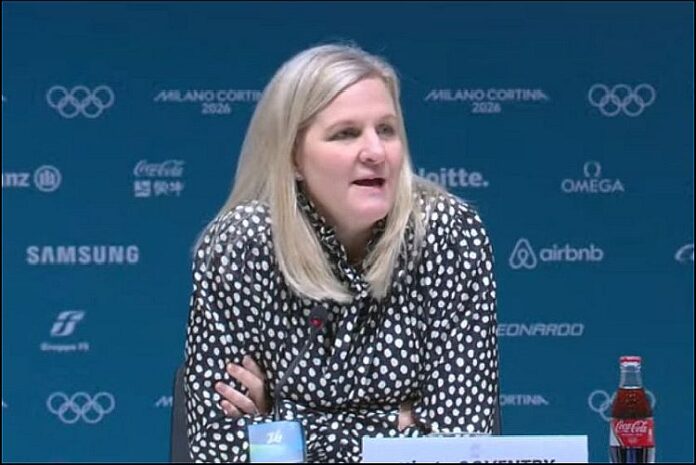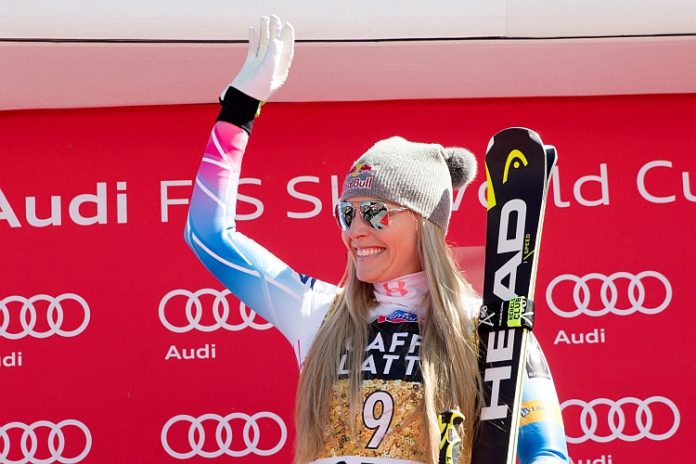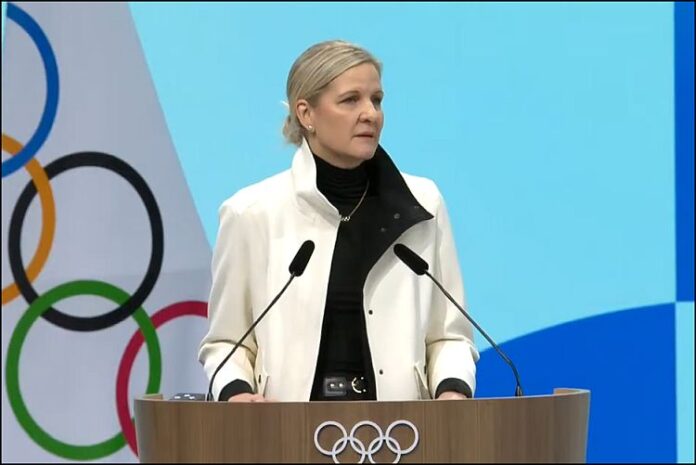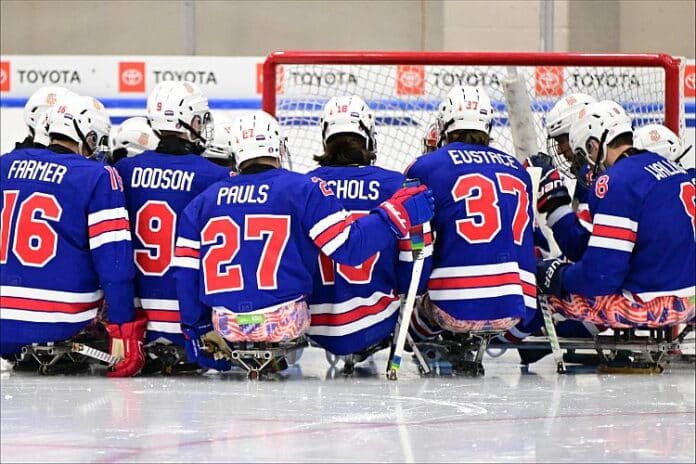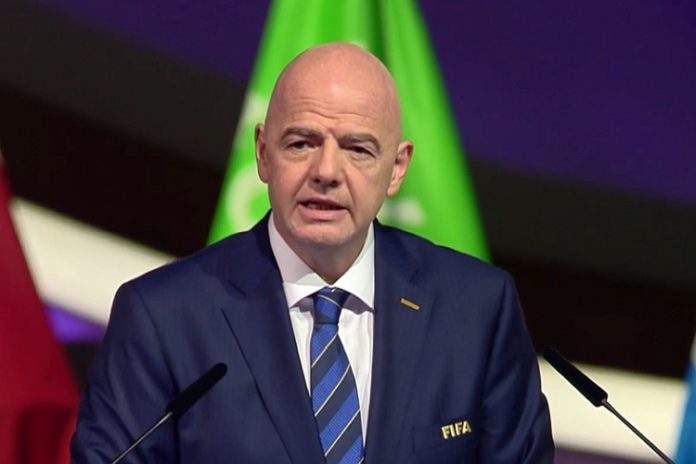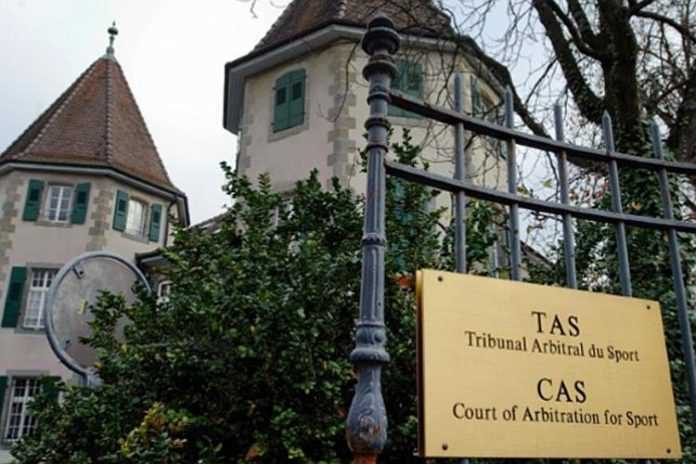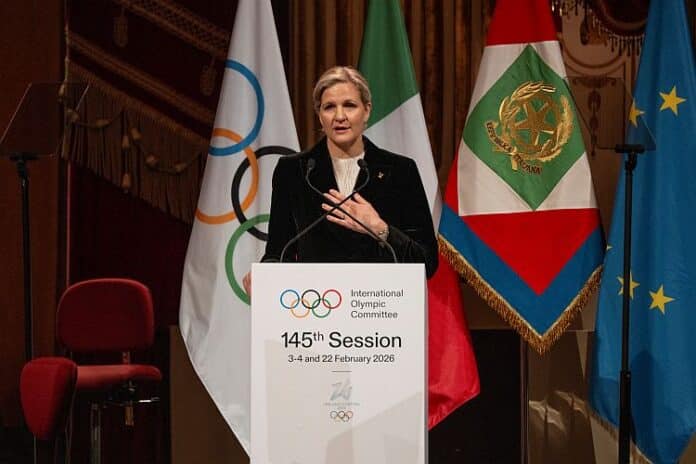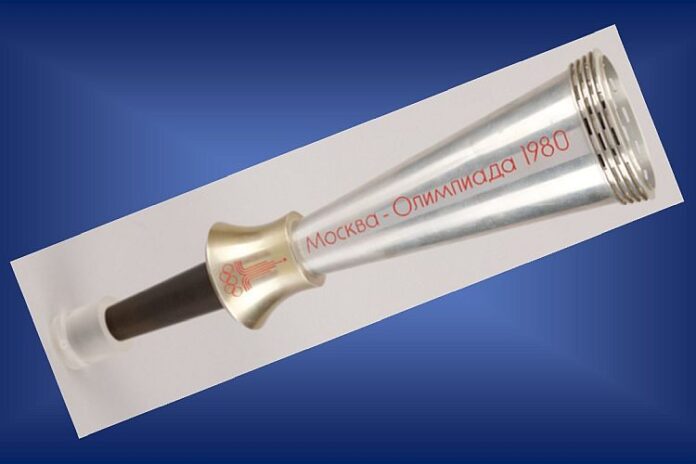★ The Sports Examiner: Chronicling the key competitive, economic and political forces shaping elite sport and the Olympic Movement.★
★ To get the daily Sports Examiner Recap by e-mail: sign up here! ★
★ Friends: YES! Now 41 donors have covered 108.1% of our winter goal for our tech support costs. Happy to start on the summer bill: you can donate here. YOU are the reason this site continues. ★
= MILAN CORTINA 2026 =
From Lane One
Last July, The Sports Examiner picked up on the quadrennial effort by Turin 2006 Winter Games chief operating officer Luciano Barra (ITA) and compiled the results of the winter-sport world championships in Olympic events to project what the outcome of the 2026 Winter Games might be.
What the numbers showed then in terms of medals:
● 41: Norway (17-13-11)
● 35: Germany (8-15-12)
● 33: United States (15-10-8)
● 31: Switzerland (12-9-10)
● 27: Canada (9-9-9)
● 22: Japan
● 21: Netherlands
● 18: France
● 17: Italy
● 16: Sweden
With five events left on Sunday, here’s where we are today, after 111 of 116 events:
● 40: Norway (18-11-11)
● 32: United States (11-12-9)
● 30: Italy (10-6-14)
● 24: Germany (7-9-8)
● 24: Japan (5-7-12)
● 23: France
● 20: Netherlands
● 20: Switzerland
● 20: Canada
● 18: Austria
Norway has set Olympic record for medals and golds with 40 and 18, just about where the 2025 Worlds results placed them. For all of the well-deserved attention to the record six gold medals for star Johannes Hoesflot Klaebo in cross country skiing … that simply duplicated what he did at the 2025 Worlds! The Norse will have a chance to add another medal in the women’s 50 km Classical on Sunday.
Where Germany has performed well in some sports, its production is down from the 2025 Worlds, while the U.S. is right where it was projected, albeit with fewer golds than hoped for, but still a record for most golds in a single Winter Games.
And there could be more American gold in the men’s hockey final and even perhaps Jessie Diggins in the 50 km Classical. It’s the best Winter Games ever for the U.S. outside of North America and could equal the 2022 Salt Lake City total of 34, the second-best ever. That would be special.
The shocker is Italy, with 30 total medals, vs. 17 during the 2025 Worlds. The country’s old high at a Winter Games was 20, so this has been a sweet Games for the home team.
A better indication of team performance has to go beyond three places, so The Sports Examiner returns our eight-place scoring, using the NCAA track & field format of 10-8-6-5-4-3-2-1 to score each event. After 16 of 17 days, the top 12:
● 480.5: Norway
● 430.0: United States
● 381.5: Italy
● 314.5: France
● 312: Germany
● 261: Canada
● 257: Switzerland
● 247.5: Japan
● 246.5: Austria
● 237: Netherlands
● 190: China
● 177: Sweden
The U.S. took the lead in top-8 placers with 89, to 85 for Norway, then 77 for Italy in its dream Games. Fourth are France and Germany at 64 each and then Austria (57).
How does this compare with 2022? Here are the top five (remember that the number of events increased from 109 to 116):
● 415: Norway
● 394: Russia
● 369: United States
● 340: Germany
● 312: Canada
In 2018 in Korea:
● 441 1/2: Norway
● 377 1/2: Germany
● 357 1/2: United States
● 352: Canada
● 208: France
The absence of Russia has made a significant impact in multiple events, but should not dim the brilliance of the Norwegian athletes in 2026. But the U.S. is also on the move and the overall improvement anticipated by the U.S. Olympic & Paralympic Committee has indeed shown up.
With Utah 2034 coming sooner than everyone thinks, the U.S. push for winter stardom is continuing as planned, even with the well-publicized disappointments early in the Games. That’s impressive.
~ Rich Perelman
● Il Tempo Olimpici ● The final day of the Winter Games in Milan is expected to be cloudy, as usual, with a high of 55 F and a low of 39 F, with just a mild breeze of two miles an hour. All calm for the closing.
In Cortina, more clouds with a 40 F high and 25 F low; also very little wind at 3 miles per hour.
● Milan Cortina 2026 ● The U.S. Olympic & Paralympic Committee announced that figure skater Evan Bates and hockey star Hilary Knight will be the flag bearers for the American team at the closing ceremony at the Arena di Verona on Sunday.
● Alpine Skiing ● American star Lindsey Vonn posted on X after her latest procedure on Friday (20th) following her crash in Cortina:
“Just a quick update… my last surgery went well. It took a little over 6 hours. I have been recovering from the surgery but pain has been hard to manage. Making slow progress but I hope I can be out of the hospital soon. Thank you all for the support.”
She posted ax x-ray of her repaired left leg with the new hardware inside, and the caption, “I’m bionic for real now.”
● Short Track ● Polish skater Kamila Sellier suffered an accidental facial injury in the sixth quarterfinal of the women’s 1,500 m on Friday, when she and American Kristin Santos-Griswold slid out.
Santos-Griswold’s skate caught Seiller in the face and she was removed to a hospital for treatment. The Polish team said she was cut on the cheek and left eyelid and had to have stitches. She had considerable swelling on her cheekbone, with further examinations needed to determine if there was a deeper injury.
● Memorabilia ● A strong sale of Olympic memorabilia by RR auction ended Friday, bringing $1.08 million in total sales, including $128,066 for a Moscow 1980 “Stadium Torch,” designed to be fail-safe even in bad weather. The first-known sale of a 2026 Milan Cortina Olympic Torch also concluded, bringing $34,879. Full details here.
= RESULTS: SATURDAY, 21 FEBRUARY =
(9 finals across 7 sports & disciplines)
● Biathlon: Women’s 12.5 km Mass Start
France finished off a superb Olympic performance with Sprint silver medalist Oceane Michelon winning her third medal of the Games with a tight victory over teammate Julia Simon, 37:18.1 (2) to 37:24.7 (1). The French took three of the five women’s golds and seven of the 15 medals available!
Czech Tereza Vorbornikova was a surprise bronze winner, just behind Simon in 37:25.5 (1) and well ahead of fourth-place Anna Magnusson (SWE: 37:44.7/0). The U.S. had no qualifiers.
All together, France won 13 medals in biathlon, Norway had 11 and everyone else had nine. Amazing.
● Bobsled: Two-Woman
After two rounds on Friday, it was Germany’s Laura Nolte and Deborah Levi leading at 1:53.93, then teammates Lisa Buckwitz and Neele Schuten at 1:54.11. Americans Kaillie Armbruster Humphries – a two-time Olympic champ for Canada – and Jasmine Jones were third at 1:54.16, with Kaysha Love and Azaria Hill fifth at 1:54.55. Monobob winner Elana Meyers Taylor and Jadin O’Brien were 12th at 1:55.13.
The third round belonged to the Germans, with defending champion Nolte, 2024 World Champion Buckwitz and 2023 World Champion Kim Kalicki the top three and Armbruster Humphries, Love and Meyers Taylor 4-5-6.
That left Nolte at 2:51.19, then Buckwitz at 2:51.54 and Armbruster Humphries in third at 2:51.74, with Kalicki (2:51.82), Love (2:52.12) and Meyers Taylor (2:52.73) trailing. On the fourth runs, Love took the overall lead (3:49.71) from Swiss Melanie Hasler, who had passed Meyers Taylor (3:50.49).
Kalicki went next and despite some bumps, took the lead at 3:49.36, but Armbruster Humphries gathered speed throughout and guaranteed at least a bronze at 3:49.21. Buckwitz was next to last and despite some bumps, built up great speed and took over the lead in 3:48.99.
Nolte was last and rolled through the course, taking the gold in 3:48.46 and matching Armbruster Humphries’ back-to-back Olympic wins in 2010 and 2014. Armbruster Humphries won her fourth Olympic medal in this event – two golds, two bronzes – and sixth overall.
Love – who at 28 has a brilliant future ahead of her – ended up fifth and Meyers Taylor seventh.
● Cross Country Skiing: 50 km Classical
He did it! It wasn’t easy, but he did it.
Norway’s Johannes Hoesflot Klaebo repeated his six-event sweep of the 2025 World Championships and set the record for the most gold medals ever won at a single Olympic Winter Games with his sixth win, in the 50 km Classical on Saturday.
He and teammates Martin Nyenget and Emil Iversen broke away from the pack by the halfway point and then Iversen dropped back with about 4 km left. Nyenget and Klaebo were side by side into the final kilometer, but Klaebo made a push on the final climb and broke away to win clearly in 2:06:44.8, then collapsed past the finish line.
Nyenget was an easy second in 2:06:53.7 and Iversen took the bronze in 2:07:15.5. Fourth was France’s Theo Schely in 2:09:44.5. American Gus Schumacher was 13th in 2:14:11.6, then Hunter Wonders in 35th (2:22:34.3).
Klaebo now owns the record book: most golds in a single with six, and most golds in Winter Olympic history with 11. At, 29, he’s good for at least one more Games, in 2030 and perhaps even to Utah in 2034. He has 13 total Olympic medals, with the record in sight at 15 by Norway’s Marit Bjorgen from 2006-18, also in cross country. But he has to wait to 2030.
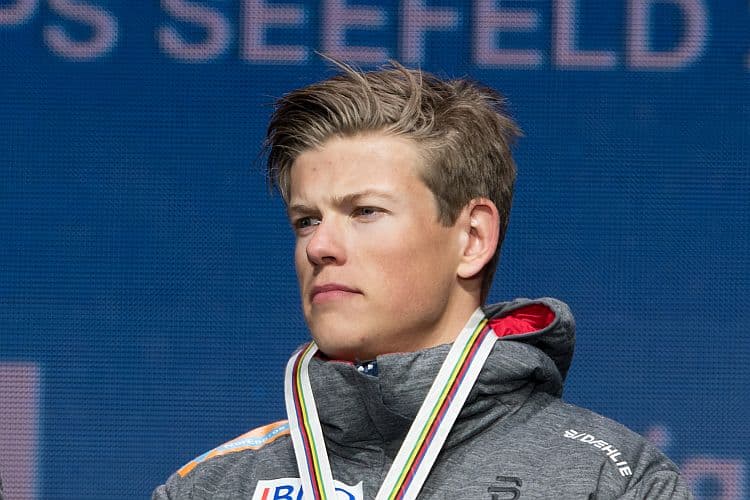
● Curling: Men’s final
The final between 2014 Olympic champ Brad Jacobs‘ Canadian rink and two-time World Champion Bruce Mouat’s British rink – the Beijing 2022 silver winners – was as tight as expected.
The Canadians went up 1-0 after the first end, but the Brits got two in the second, one in the fourth and two more in the sixth for a 5-4 lead. Canada got one to tie in the seventh, but Britain won a point in the eighth for a 6-5 lead.
The ninth was chaotic, but a couple of missed placements for Britain allowed Jacobs to clear their stone and take three points for an 8-6 lead heading to the 10th end. The Canadians got one more in the 10th and finished with the gold and a 9-6 victory.
It’s Jacobs’ second gold and a second-straight bronze for Mouat. It’s the fourth gold for Canada in men’s curling, the most ever and first since Jacobs won in 2014.
● Freestyle Skiing: Men’s Ski Cross; Mixed Team Aerials
Upsets started quickly in the men’s Ski Cross, as World Cup star Reece Howden (CAN) was eliminated in the quarterfinals. Defending champion Ryan Regez (SUI) was last in his semifinal and would not race for medals.
Instead, Italy had 2023 World Champion Simone Deromedis in the final, along with 2022 Olympic silver medalist Alex Fiva (SUI). Deromedis got off quickly and was never headed, winning the gold cleanly. Meanwhile, Fiva was edged by Italy’s unheralded Federico Tomasoni for the silver and had to settle for bronze.
While Fiva won a medal for the second Games in a row, Deromedis and Tomasoni won italy’s first-ever medals in this event.
¶
This was the second appearance for the Mixed Team Aerials, with the U.S. the defending champion and Chris Lillis returning from that squad and he and Kalia Kuhn were back from the 2025 World Champion team.
And they showed, with Connor Curran as the third member, that they were the favorites, scoring 351.23 to lead the first final by more than 36 points and head to the medal round.
Once there, Switzerland managed 296.91 points, China scored 279.68 and Australia had 256.04. Kuhn scored 94.44, Connor added 113.72 and in the third round, Lillis came up for the final jump of the event and stuck the landing on a back double full-full-full for 117.19 points, and a gold-medal-winning 325.35 total.
Lillis was eighth in the men’s final and Connor was 12th; Kuhn – the 2025 World Champion – finished sixth. So this was their shot at redemption, as Kuhn noted afterwards:
“All of us came in so motivated after the individual events because it didn’t really go any of our ways. And so we came in today motivated, strong as ever, we adjusted our jumps. We did some of the best jumps we’ve ever done, and we put it down when it counted, so we are so ecstatic right now.”
● Ski Mountaineering: Mixed Relay
No surprise as French medal winners Emily Harrop (silver) and Thibault Anselmet (bronze) led throughout and won in 26:57.44. Sprint winner Marianne Fatton and Jon Kistler had the Swiss in second by halfway and they won the silver in 27:09.30, about 12 seconds back.
Third was clearly the Spanish, with men’s Sprint winner Oriol Cardona Coll and Ana Alonso, in 27:23.94, ahead of the U.S. pair of Ana Gibson and Cameron Smith, in 27:40.43 in fourth.
This was the first appearance of ski mountaineering in the Games; the question now is whether it will stay in for 2030, or disappear.
● Speed Skating: Men’s Mass Start; Women’s Mass Start
Chaos is always promised in the Mass Start races, but in the men’s race, a wily veteran broke away and gained control. Dutch star Jorrit Bergsma, the 2014 10,000 m gold medalist and the 2026 bronzer, put the pedal down early in the race with Denmark’s Viktor Hald Thorup and were 1-2 after three laps and continued to break away.
Bergsma won going away in 7:55.50, with Thorup taking silver in 8:00.52. Their tactics took the race away from the kickers, like American star Jordan Stolz. He was left to battle for the bronze and was third with a lap to go, but Italy’s 2025 World Champion Andrea Giovannini had a faster last lap – 23.16 to 23.68 – and won the bronze, 8:04.42 to 8:04.51, with Korean Jae-won Chung in fifth in 8:04.60.
At 40, Bergsma is the oldest speed-skating gold medalist in Olympic history!
¶
The women’s Mass Start has been dominated by Dutch ace Marijke Groenewoud, the 2021, 2023 and 2025 World Champion, and a two-time winner and two-time runner-up on the World Cup circuit.
She was near the front of the final early, then moved back in the middle laps. But she knew when to move and was fourth after 14 laps and first at the bell. She finished with a brilliant 24.66 lap (for 400 m) and crossed with the gold in 8:34.70.
American Mia Manganello, the World Cup seasonal winner, had her eyes on Groenewoud and was second at the bell, but was passed on the final lap by Canadian star Ivanie Blondin. Who put up a 24.72 final lap and got the silver in 8:35.09.
But Manganello, 36, who won a Team Pursuit bronze in 2018, finally got her individual Olympic medal in third in 8:35.39. She held off a late charge from double Olympic winner Francesca Lollobrigida (ITA), who finished in fourth in 8:35.95.
It was the fourth win in the women’s skating for the Dutch, across seven events, to go with one win – Bergsma – in the men’s events.
Elsewhere:
● Curling: In the women’s bronze-medal match, three-time World Champion Rachel Homan’s Canadian rink was down 3-2 in the fifth to Tabitha Peterson and the U.S., but scored three in the sixth, three in the eighth and two in the 10th to offset American deuces in the seventh and ninth for a 10-7 win.
The medal for Canada is its first in women’s curling since 2014; the U.S. has never won a women’s Olympic curling medal.
● Ice Hockey: Defending champion Finland faced 2022 Olympic bronzers Slovakia for the bronze in Milan, and had a 2-1 lead after two periods, thanks to scores from Erik Haula and Thomas Tatar at 8:05 and 19:30 of the second stanza.
The Finns pulled away in the third, scoring a power-play goal at 8:27 by Roope Hintz and then a fourth 42 seconds later by Kaapo Kakko. It was 5-1 after Joel Armia scored at 15:32 and the final was 6-1 after an empty-netter by Haula at 18:42. The Finns had 35 shots to 31 for Slovakia.
It’s the fourth medal in the last five Games for the Finns, with bronzes in 2010 and 2014 and then the 2022 gold.
= PREVIEWS: SUNDAY, 22 FEBRUARY =
(5 finals across 5 sports)
● Bobsled: Four-Man
German star Francesco Friedrich has won the last two Olympic titles, and the last seven World Championship golds in a row. But it was countryman Johannes Lochner who won the Two-Man, tied Friedrich for the 2017 Worlds gold and has been the Worlds runner-up three times since.
In the 2025-26 World Cup season, it was a three-way fight between Friedrich (two wins), Lochner (two) and Adam Ammour with two. German sleds swept the medals in four of the seven races and must be favored to do so again.
The three World Cup medals not won by German sleds in the World Cup were bronzes for Jin-su Kim (KOR), Patrick Baumgartner (ITA) and Swiss Michael Vogt. Candidates for a surprise bronze start with British driver Brad Hall, with a 2023 Worlds silver and 2025 bronze. American Frank Del Duca drove to an impressive fourth-place finish in the Two-Man.
In the first two races on Saturday, German sleds were, yes, 1-2-3. Lochner won the first run and was 0.01 behind Ammour on the second run, to stand first at 1:48.61, followed by Friedrich at 1:49.04, then Ammour at 1:49.20. Vogt’s Swiss sled was fourth, but in striking distance at 1:49.32.
Kris Horn was the fastest U.S. sled in ninth at 1:49.61, then Frank Del Duca was 12th in 1:50.02.
There were some unfortunate crashes, including Austrian pilot Jakob Mandlbauer, who had to be removed on a stretcher and was treated at a Cortina hospital, happily without serious injury. His brakemen were uninjured. Sleds from France and Trinidad & Tobago also crashed and did not finish, but no injuries were reported.
● Cross Country Skiing: Women’s 50 km Classical
Sweden has dominated the women’s skiing, with Frida Karlsson winning the 10 km, and the 20 km Skiathlon, both times over teammate Ebba Andersson.
But now Karlsson has withdrawn from the 50 km Classical due to illness; she was the 2025 World Champion, with Norway’s Heidi Weng second.
That helps American Jessie Diggins, the 10 km bronze winner, but who also shocked everyone in 2022 with her Olympic silver in the 30 km. If she is feeling good enough – after a first-day crash in the Skiathlon and multiple races since – she will be a factor, in her final Games.
During the World Cup season, two 20 km Mass Starts were held, with Swede Jonna Sundling – better known as a sprinter! – won over Diggins and Weng in November and then Finland’s Johanna Matintalo was victorious in the last pre-Games race, ahead of Diggins and Astrid Slind (NOR).
Not to be counted out is Austria’s Teresa Stadlober, a 20 km Pursuit bronze winner during the World Cup season.
● Curling: Women’s final
Two titans of the sport collide in the gold-medal match as Swede Anna Hasselborg’s rink faces the four-time World Champions from Switzerland and skip Silvana Tirinzoni.
These are no strangers to each other; Hassleborg won the 2018 Olympic title, 2022 Olympic bronze and Worlds silvers in 2018 and 2019. Tirinzoni’s rink won the 2019 Worlds gold against Hasselborg and also won in 2021, 2022 and 2023 and finished second in 2024 and 2025.
In the round-robin, it was the Swedes with a 6-4 win back on 16 February. The Swedes have already kept their Olympic medal streak going, winning a women’s medal in six Games in a row. The Swiss are looking for their first Olympic medal since 2006, and first win.
● Freestyle Skiing: Women’s Halfpipe
This was postponed to Sunday due to heavy snowfall. China’s Eileen Gu was a spectacular winner of this event in 2022, over 2018 gold medalist Cassie Sharpe (CAN) and teammate Rachel Karker. Since then, Karker (2023) and Sharpe (2025) both won Worlds bronzes.
At the 2023 Worlds, it was Britain’s Zoe Atkin second, and Atkin moved up to Worlds gold in 2025. China’s Fanghui Li took the 2025 Worlds silver, and Gu, Atkin and Li all won World Cup events this season.
In the qualifying round, Atkin put up 91.50 right away and qualified first, with Li at 85.00 and 90.00. Sharpe (88.25), Gu (86.60) and World Cup medalist Svea Irving of the U.S. made it in at 80.75.
Qualifying fourth was the wild card, Australia’s Indra Brown (87.50). At age 16, she won a World Cup gold, silver and bronze in four events this season. She is dangerous.
● Ice Hockey: Men’s final
The Canada vs. U.S. match-up has been keenly anticipated since the 2025 Four Nations Face-Off final in Toronto, where the Canadians won by 3-2 in overtime, on 20 February 2025 on a Connor McDavid score at 8:18. In the round-robin portion, the U.S. won by 3-1, using an aggressive style.
Most of the players on both sides were on those Four Nations teams.
In terms of Olympic play where NHL players have been involved, this is the third gold-medal match between the two:
● 2002: Canada 5, U.S. 2
● 2010: Canada 3, U.S. 2, in overtime
Canada owns nine Olympic titles, with the last in 2014. The U.S. has two golds, in 1960 in Squaw Valley and in 1980 in Lake Placid. Another classic could be in store.
¶
★ Receive our exclusive, weekday TSX Recap by e-mail by clicking here.
★ Sign up a friend to receive the TSX Recap by clicking here.
★ Please consider a donation here to keep this site going.
For our updated, 45-sport, 910-event International Sports Calendar for 2026 and beyond, by date and by sport, click here!







